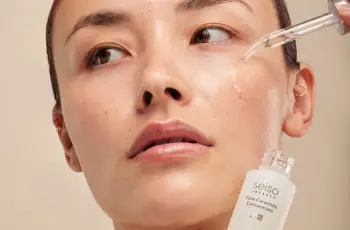
Progeline in Skin care: Trifluoroacetyl Tripeptide-2
Progeline, also known as Trifluoroacetyl Tripeptide-2, is a peptide frequently found in anti-aging serums such as SkinMedica TNS Advanced+ Serum. This innovative antiaging peptide works by inhibiting the production of progerin, a protein that accelerates cell aging. By reducing progerin synthesis, Progeline helps prevent skin sagging, making it a popular choice for those seeking to keep skin looking young. As a dermatologist in Miami specializing in researching the best skincare ingredients for the 16 different Baumann Skin Types, I am here to explain what this anti-aging peptide does for your skin and help you decide if it is a good addition to your skincare routine.
A peptide antiaging ingredient
Found in SkinMedica TNS Advance+ Serum
Blocks production of the protein progerin which is found in the aging disease progeria
Not many studies on skin have been done
What is Progeline: The Anti-Aging Peptide in Skin Care
Trifluoroacetyl Tripeptide-2, or Progeline, is an antiaging peptide found in anti-wrinkle serums such as SkinMedica TNS Advanced+ Serum. To find the best antiaging peptides and products for your skin type, take our quiz and look for products that display your skin type octagon to know they are right for your skin.
Progeline: Trifluoroacetyl Tripeptide-2
Trifluoroacetyl Tripeptide-2, is a cutting-edge peptide frequently included in advanced anti-aging skincare formulations. This three-amino-acid peptide seems to have the ability to inhibit the production of progerin, a protein that accelerates cellular aging. By reducing progerin synthesis, Progeline may help preserve skin elasticity, protect elastin, and prevent skin sagging. Its multifaceted benefits, including the reduction of wrinkles and the improvement of overall skin texture, have made it a popular choice in anti-aging products. As a dermatologist in Miami specializing in the best skincare ingredients for the 16 different Baumann Skin Types, I am here to explain what this anti-aging peptide does for your skin and help you decide if it is a suitable addition to your skincare regimen.
Products with Progeline
Trifluoroacetyl Tripeptide-2 is found in face and neck serums to prevent skin sagging. Here are some of my favorite products with progeline:
Benefits
This three-amino-acid peptide works by inhibiting the production of progerin, thereby reducing its detrimental effects on cellular structure and function. Manufacturers claim that Progeline can:
Preserve skin elasticity
Reduce sagging, particularly in areas such as the jawline
Diminish the appearance of wrinkles
Enhance overall skin texture and smoothness
Protect elastin, thereby helping to prevent sagging
Note that there is not much data to support these claims that I can find. If you find any good studies, please tell me in the comments.
I have seen this claim on the ingredient manufacturers website but cannot find any proof or publication to support the following:
“Clinical studies have shown promising results, with a 2% Progeline cream reportedly preserving skin elasticity and firmness by 20% in 28 days and lifting a sagging jawline by up to 10% in 56 days. Additionally, Progeline has been found to reduce progerin synthesis, inhibit matrix metalloproteinases (MMPs) and elastase, increase syndecan production, and contract collagen.”
Safety
According to the Environmental Working Group (EWG), Progeline, as Trifluoroacetyl Tripeptide-2, has a moderate safety profile with some concerns related to cancer, allergies, and developmental and reproductive toxicity. While it is generally considered safe for topical use, comprehensive safety data, particularly regarding long-term use and effects during pregnancy and breastfeeding, are limited.
There are no reports of allergic reactions, however, it is possible to have an allergic reaction to peptide ingredients.
The Cosmetic Ingredient Review (CIR) has not published any safety findings on Trifluoroacetyl Tripeptide-2, but the general consensus from other sources, such as the Cosmetics & Toiletries magazine and various ingredient databases, highlights that it is considered safe for topical use. Further research is necessary to fully understand its long-term effects
Side Effects
While Progeline is generally well-tolerated, some individuals may experience skin irritation or allergic reactions. It is recommended to perform a patch test before using any new skincare product if you commonly have skin allergies.
Pregnancy
The safety of Progeline during pregnancy and breastfeeding is not well-documented, so caution and consultation with a healthcare provider are advised.
Mechanism of Action
Progeline is an antiaging peptide that helps keep your skin looking young by blocking the production of a protein called progerin. Progerin makes cells age faster, leading to wrinkles and sagging skin. By stopping progerin from being made, Progeline helps maintain skin’s elasticity and firmness, keeping it smoother and less saggy.
What is Progerin?
Progerin is a defective variant of the lamin A protein, which is crucial for maintaining the structural integrity of the cell nucleus. In normal circumstances, lamin A undergoes a series of processing steps to become fully functional. However, in the case of progerin, a crucial processing step is skipped, resulting in a version of the protein that retains a hydrophobic oligoisoprene chain. This defective processing causes progerin to accumulate on the inner side of the nuclear envelope, disrupting its structure and function.
The accumulation of progerin is linked to the accelerated aging seen in Hutchinson-Gilford Progeria Syndrome (HGPS), a rare genetic disorder. In HGPS, a point mutation in the LMNA gene results in the production of progerin, leading to rapid aging and a significantly shortened lifespan. The structural distortions caused by progerin impair nuclear-cytoplasmic transport and increase cell death, contributing to the aging process.
Research suggests that progerin also plays a role in the natural aging process. The presence of progerin in individuals without progeria indicates that it may contribute to the gradual decline in cellular function and vitality as we age. Strategies to prevent progerin accumulation or enhance its clearance are being explored as potential anti-aging therapies.
Sun and Progerin
Sun exposure, particularly longwave ultraviolet A (UVA) radiation, has been shown to increase levels of progerin in the skin, accelerating the aging process. UVA radiation penetrates deeper into the skin compared to UVB, reaching the dermis and causing oxidative damage. This damage leads to alternative splicing of the LMNA gene, resulting in increased production of progerin. A study by Takeuchi and Rünger (2013) demonstrated that UVA exposure, but not UVB, induces progerin expression and causes HGPS-like nuclear abnormalities in skin cells
Conclusion
In conclusion, Progeline (Trifluoroacetyl Tripeptide-2) shows promise as an anti-aging ingredient by targeting progerin, a protein linked to accelerated aging. While initial studies and product claims are encouraging, further research is needed to fully understand its benefits and safety profile. As with any skincare ingredient, it is important to consider individual skin type and sensitivity when incorporating Progeline into a skincare routine.


